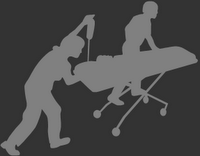 And you're wondering what sort of things you need for this venture. It can be overwhelming and there are a TON of resources that you'll be utilizing. You're strapped for cash and this whole school thing is already cutting into your future pay. So what do you do?
And you're wondering what sort of things you need for this venture. It can be overwhelming and there are a TON of resources that you'll be utilizing. You're strapped for cash and this whole school thing is already cutting into your future pay. So what do you do?Some professors will have a recommended reading list -- they might even require some texts. There's only a few that I've been told are really required and those are the only ones you should really buy in your first year.
You might also be hearing about PDA software. You don't need to fork over a lot of money to get the portable info you need. There's a few programs that everyone I've talked to uses and I'll share them with you.
First, some reading lists:
So you'd like to... know what books I bought for medical school Amazon.com
So you'd like to... succeed in medical school Amazon.com
Notice the overlap in books.
A medical dictionary like Taber's or Stedman's comes with software. I bought the Stedman's with PDA software and I really like it. Since I'm pretty clueless at this stage in the game, it has been very helpful.
Robbin's Pathologic Basis of Disease is a must buy. Some people recommended that I read through the 1st ten chapters of this big book by the end of the semester. Sure. That doesn't sound so bad, but it is dense reading. Perhaps "baby" Robbins (Basic Review of Pathology) would be better suited for this purpose.
Lippincott's has a review of Biochemistry, Pharmacology and Microbiology. Biochem is the favored Lippincott's text; the other subjects have different books that suit different people.
Clinical Microbio made ridiculously simple looks ridiculous alright. At first, I didn't really like the pictures, but they are starting to grow on me now. I already took microbio in college, so most of the concepts are not very helpful. There are a lot of fun mnemonics though!
Each school has their own curriculum. My Med School is geared by case-based studies of organ-systems, so the books that I have are mainly looking at differential diagnoses, rather than "basic" science subjects covered in the USMLE Step 1.
PDA software sites
Ectopic Brain is a blog with a lot of up-to-date resources.
Doctor's Gadgets
CollectiveMed.com
Yee's Medical Palm Info is little outdated, but he still has some good info.
Epocrates Rx free is a drug reference program that also has a formulary based on local insurance policies so you can write the right prescriptions.
Medical Mnemonics.com - Use this! It is a lot of fun... and I've already been posting up a few mnemonics from this program that I've found useful.
Johns Hopkins Antibiotics Guide is an "Epocrates Rx" for Abx.
MedCalc - I'm hoping I won't get in trouble by relying on this one too much in the future.
On a different note, I really like using McPhiling to switch quickly between my programs without going to Home first. It also has a cool pseudo "Alt-Tab" feature to flip back and forth between your current and previous program.
Well, I hope that has been helpful!
If you have any other links or books to recommend, please feel free to comment.





No comments:
Post a Comment